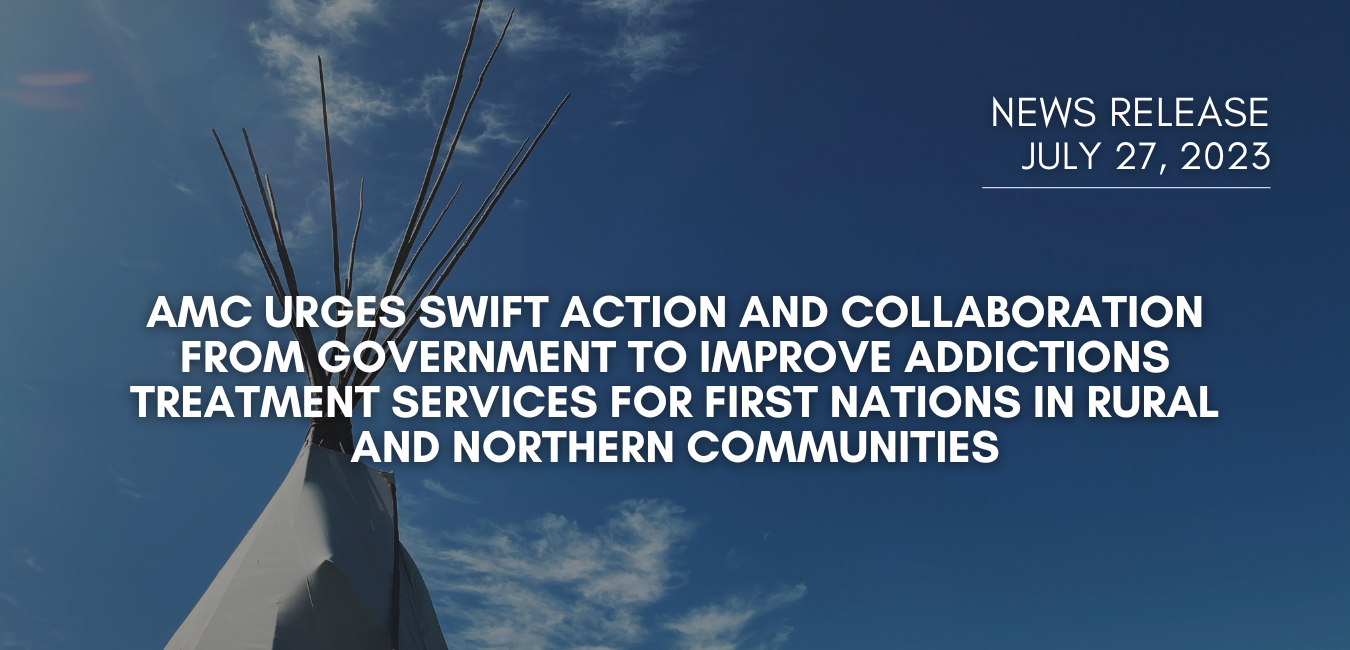AMC Urges Swift Action and Collaboration from Government to Improve Addictions Treatment Services for First Nations in Rural and Northern Communities

July 27, 2023
Treaty One Territory, Manitoba
AMC Communications
Treaty One Territory, Manitoba – The Assembly of Manitoba Chiefs (AMC) calls for swift action following the recent report by the Auditor General of Manitoba (AGM). The report, “Addictions Treatment Services in Manitoba Independent Audit Report,” concludes Manitobans lack access to appropriate addictions treatment services when they need them the most, identifying significant gaps in service — particularly in rural and northern areas of the province.
Grand Chief Cathy Merrick of the Assembly of Manitoba Chiefs voiced deep concern, stating, “Many Manitobans seeking addiction treatment are First Nations citizens. Our people are disproportionately affected by addictions compared to all other Manitobans.”
According to a report released in 2023 by the First Nations Health and Social Secretariat of Manitoba (FNHSSM), there is a significant variation in the proportion of accidental opioid-related deaths among First Nations individuals across different Tribal Council Areas. The data shows that the rate ranges from 8.1 in the SERDC region to 21.6 in independent southern communities compared to all other Manitobans.
To address this issue, a comprehensive strategy must be developed to ensure the continuity of mental health care and addiction services for First Nations. This strategy should be created in partnership with First Nations leadership, Elders and Knowledge Keepers to encompass culturally responsible prevention, harm reduction, crisis intervention, and recovery services.
The AMC remains steadfast in its commitment to collaborate with the Province of Manitoba, the Ministry of Health, the Ministry of Mental Health and Community Wellness, and Shared Health to formulate concrete and actionable solutions for First Nations. The key goals for AMC and First Nations are as follows:
- Improve the timeliness and accessibility of services, especially in northern and remote communities.
- Enhance data quality by respecting First Nations’ sovereignty over data, using disaggregated data, and identifying culturally appropriate performance measures.
- Increase capacity and coordination for opioid agonist treatment in urban, remote, and rural settings.
- Expand the availability of culturally safe detox, pre-treatment, and interim care, both closer to home and in urban settings.
- Provide additional options for wraparound support, aftercare, and supportive housing.
- Advocate for the influence of provincial standards for addiction treatment services.
- Lobby for increased capacity to meet treatment demand, including mandatory Opioid Agonist Treatment (OAT) Prescriber Training for Nurse Practitioners and Physicians in First Nations communities, as well as mandatory Sublocade Certification Training for Approved Prescribers and Registered Nurses working in these communities.
- Improve existing provincial health services and strategies to be more inclusive of First Nations.
- Offer cultural training on addictions for health professionals to address stigma and promote harm reduction.
“Addressing this legacy requires increased partnerships and investments within the provincial healthcare system to support healing for First Nations and all citizens,” emphasized Grand Chief Merrick, “We are ready to work with the province, we need them to be ready to work with us, too” Grand Chief concluded.
For more information, please contact:
Communications Team
Assembly of Manitoba Chiefs
Email: media@manitobachiefs.com
About the Assembly of Manitoba Chiefs
The AMC was formed in 1988 by the Chiefs in Manitoba to advocate on issues that commonly affect First Nations in Manitoba. AMC is an authorized representative of 62 of the 63 First Nations in Manitoba with a total of more than 151,000 First Nation citizens in the province, accounting for approximately 12 percent of the provincial population. AMC represents a diversity of Anishinaabe (Ojibway), Nehetho / Ininew (Cree), Anishininew (Ojibwe-Cree), Denesuline (Dene) and Dakota Oyate (Dakota) peoples.